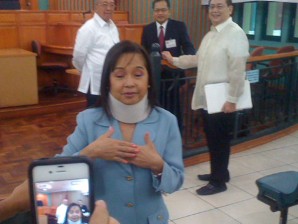Supreme Court junks suits vs Arroyo Maguindanao martial law; Corona dissents
BAGUIO CITY—Voting 9-6, the Supreme Court ruled that seven suits contesting the constitutionality of a martial law proclamation by former President Gloria Macapagal-Arroyo in Maguindanao in 2009 had been rendered moot because she lifted the proclamation before Congress could review it.
This time, Chief Justice Renato Corona dissented from the majority decision, which dismissed all constitutional challenges raised against Arroyo for declaring martial law and suspending the writ of habeas corpus in Maguindanao more than two years ago.
Proclamation No. 1959, which took effect for only eight days, was intended to deal with the reported uprising of forces loyal to the Ampatuan family after its members were implicated in the massacre of 57 people in Maguindanao, mostly journalists, on Nov. 23, 2009.
The decision, penned by Associate Justice Roberto Abad, was dated March 20, but it was distributed to reporters here only on Monday. The high court’s justices are holding their annual summer sessions in Baguio City.
In separate dissenting opinions, Associate Justices Antonio Carpio Presbitero Velasco Jr. argued that the court failed to use the opportunity to guide future presidents about the proper way of imposing martial rule.
Carpio said Proclamation No. 1959 was the first case when a Philippine president declared martial law since the administration of former President Ferdinand Marcos.
“[It] provides this court with a rare opportunity… to formulate controlling principles for the guidance of all sectors concerned,” he said.
Corona indicated that he subscribed to the dissenting opinion of Velasco, who believed the court “must take the bull by the horns to guide, explain and elucidate [the parameters of a declaration of martial law] to the executive branch, the legislative branch, the bar and more importantly, the public.”
The majority decision, however, believed that a court-imposed guideline for martial rule would not be effective.
In Zamboanga City, Colonel Randolph Cabangbang, spokesperson of the military’s Western Mindanao Command, said Proclamation No. 1959 made it easier for both the Armed Forces of the Philippines and the Philippine National Police to enforce law and order after the Maguindanao massacre. With a report from Julie S. Alipala, Inquirer Mindanao
Originally posted: 9:50 pm | Monday, April 16th, 2012
